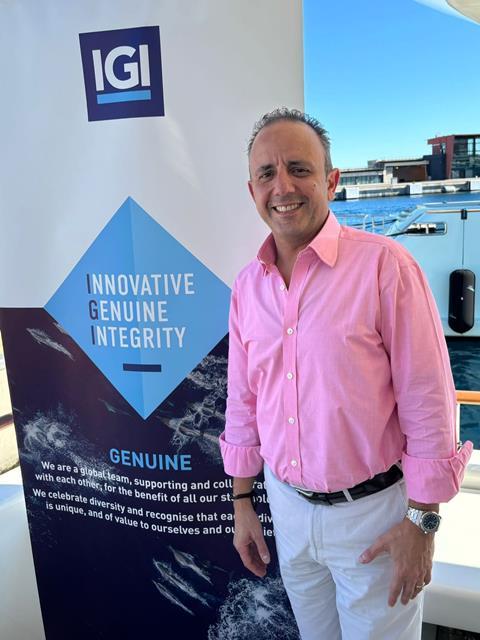The re/insurer’s treaty business has doubled in size, particularly in London market specialty, according to IGI’s president and CEO, speaking to GR at RVS 2024 in Monte Carlo.

President and CEO of IGI, Waleed Jabsheh has doubled the size of the re/insurer’s treaty reinsurance book in the past 18 months, and emphasises London market specialty business as the source of profitable growth, provided discipline is maintained.
Jabsheh (pictured) was speaking to GR in Monte Carlo at the at the Rendez-Vous de Septembre (RVS 2024).
IGI splits its business into three categories: long-tail lines of business, which Waleed described as “under pressure”; short-tail insurance, for which “the picture is mixed”; and treaty reinsurance – which stands out as the growth opportunity, given market dynamics.
“Reinsurance is by far the strongest and the most attractive segment that we do,” Waleed said.
“We buy reinsurance and we sell reinsurance, but our reinsurance play as a seller of reinsurance is growing significantly. We doubled the size of our book in 2023, from around $30m to $60m. And this year, we’ve grown the book so far by about 25-30%,” he added.
Traditionally, IGI’s treaty portfolio has been property catastrophe business, along with some marine reinsurance, but this is changing, he noted.
Property catastrophe business is still growing, and makes up more than 50% of the book, but has grown much less in comparison to specialty business, which makes up the remainder.
The book is becoming more diversified, he explained, due to “across the board” specialty opportunities, starting to reinsure lines of business that the company has previously underwritten in the primary market.
“Within specialty, marine and energy, war and political violence (PV), cyber – the market has turned itself around so in such a positive way over the last 18 months,” Jabsheh said.
IGI maintains a company box at Lloyd’s “as another distribution source”, but not a syndicate, so all of this business is being underwritten on its own company market paper.
Of the new lines, cyber is entirely new to IGI, Jabsheh explained, with all of this business being underwritten from the firm’s London-based, reinsurance-focused operation. Other reinsurance business is underwritten from its Jordanian base or its Bermuda business.
“Cyber is new to us. We’ve only been writing it for the past 18 months. We’re taking a very cautious approach to cyber – it’s not something we’re going to jump into,” he said.
“Some of this is proportional, some of it is excess of loss, some of it is stop loss. The beauty of doing it – cyber – on a reinsurance basis is that you can limit your downside – proportional treaties have loss ratio caps and excess of loss treaties are limited by nature,” he said.
He is not afraid of cyber catastrophe, provided these limits are adhered to.
“We have an aggregate that we stick to. In the worst cyber event, you can think of, we know what the maximum downside is. As long as we stay within those parameters, which we will, of course, then we’ll be fine,” Jabsheh said.
London is also the underwriting hub for IGI’s budding PV business, despite the group’s Middle Eastern origins, which account for “about 10%” of its underwriting spread.
“We use our network to target the business from where we feel it is the best place to target it, but the fact of the matter is that London is very much the specialty reinsurance centre, and you’re not going to see as much of that businesses come through Dubai,” Jabsheh said.
IGI does underwrite some PV on a primary insurance basis, but Jabsheh was more upbeat about the PV market’s reinsurance performance than the challenges it faces on a direct basis.
“PV is a lot more attractive to us as reinsurance rather than as a direct play,” he said. “When the PV reinsurance market took significant action, two years ago, to correct the nature of how it was underwritten, after Ukraine and South African riots, you would have hoped that the action taken would filter through the direct market; some of it did, but nowhere near the extent that I would have expected.”
He emphasised that IGI maintains a PV book in Dubai “with an extremely healthy book of business”, and that “the Middle East doesn’t scare us”, but that the global diversification that can be achieved on a PV reinsurance basis is a bigger growth opportunity.
“As you stick to what you know, stick to the parameters, and the risk appetite tolerances that you’ve set, then you will be fine. Our Middle Eastern PV book is probably the most profitable within the portfolio. Know what you’re covering; know who your clients are; know the dynamics of the markets you’re operating in, and the rest is the rest should be okay – discipline,” he said.
He returned to the reinsurance market to re-emphasise his point about the need to maintain discipline “everywhere” to maintain the profitability of growth.
“There has to be discipline in any time. It’s not just in the market that we’re in now, whether it’s hard, soft, stable, whatever it is, you have to be disciplined in this market. Lack of discipline will bite you at some point,” Jabsheh added.










No comments yet